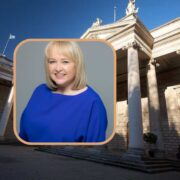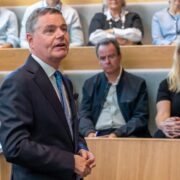Podcast Ep 271: Larissa Feeney, founder and CEO of Kinore discusses her entrepreneurial journey, her remote-first business model, and ambitious plans for growth.
The founder of born-on-the-internet business Kinore (formerly Accountant Online) spoke to the ThinkBusiness Podcast about how she took a rural business and turned it into a nationwide professional services firm. At a time when it seems like many businesses are issuing return-to-the-office edicts, Feeney believes the reality is somewhat different.
That business, Ireland’s first remote-first finance and business services firm, Kinore, is taking remote work to the next level by combining strategic foresight with proactive technology management.
“I had three small children, lived in a rural area, and it was the middle of the recession. I was looking for something that would work for me in terms of work-life balance – something I could work around the kids”
The way Feeney sees it, digital-first doesn’t mean disconnected – it means deliberate. From data-led device management and digital learning to meaningful in-person connection over office space, Kinore is building a remote model that’s high-performing, secure, and built for the long term.
-
You can also listen to the Podcast on:
-
Spotify
-
SoundCloud
-
Apple
Is Kinore a continuation of Accountant Online, or is it a separate entity?
It was a rebrand of Accountant Online. I started it many years ago now, and at the time, it was very much ahead of its time. We were delivering services online when it was completely and utterly unheard of. As time went on, that became more popular. I felt that as the company had grown, our clients had grown, and essentially, the brand Accountant Online didn’t accurately reflect the breadth of services that we were delivering to our clients. It was quite narrow, and we were delivering everything – accounts, all compliance services, as well as advisory and digitisation projects.
“I realised very quickly that the client didn’t care where the work was done”
So I felt it was time to ask whether we needed to look at the brand. I asked our clients, our team, our board, the senior team, myself, and we collated all of the answers. It was pretty much unanimous that it was time to make sure the brand reflected the services we were delivering to our clients on a day-to-day basis.
Tell us about your own journey into being an entrepreneur, particularly the rural aspect – you’re based in Donegal. Was geography a barrier?
I never intended to start a business. There are no entrepreneurs in my family. I did a degree originally in Hospitality Management, then literally fell into accountancy and did my exams. After I was probably a year or so qualified, I had three small children, lived in a rural area, and it was the middle of the recession. I was looking for something that would work for me in terms of work-life balance – something I could work around the kids.
“We hear a lot about AI, and it is about making it as efficient as we can for businesses. It’s not necessarily about reducing costs or reducing headcount, but making sure that your people are adding as much value as possible to your business”
I was very adamant that I didn’t want to waste the qualification I had worked so hard for. I was really proud of becoming a chartered accountant and felt very strongly that I should be able to progress my career while living in a place I want to live in and raise the family the way I want to raise them.
I gradually started to get clients, literally one by one. I would get a phone call, somebody would want books done, and I just never said no. I wasn’t fussy – if it was to do with numbers, I was there. I realised very quickly that the client didn’t care where the work was done. I had come from a very traditional office where we wore suits, were in at nine, out at five. This realisation that the client just wanted the work done right and wanted you to be responsive – that opened up the whole country, didn’t it?
How did the online aspect develop?
When Accountant Online was born, the first version of the website went live in 2011. I remember watching after the kids went to bed every night – I would look for Accountant Online on Google. I found it on page 12 and eventually worked its way up to page one. The first call I got from that website was from a business in Cork. I thought, this is really interesting, because he’s in Cork, I’m in Donegal, all the accountants between me and him, and he found me and was happy to work with me. That was the start of it.
“I felt that for this business, we needed to commit to one or the other. A hybrid wouldn’t work for us. Committing to remote first means a whole different way of working”
Once I spotted the opportunity and realised I could make a living from it, I realised I could build a business from it, bit by bit. What cemented that for me was when angel investment came into the business in 2017. When other people were willing to invest, that really validated the concept for me.
Kinore is described as “remote-first finance and business services.” That sounds like a lot more than just doing the books?
Doing the books is a big part of it – compliance encompasses everything from company formation services, company secretarial services, tax, accounts, payroll, bookkeeping, and VAT. But it also means working with our clients to make sure that their finance function is as efficient as it can be. That’s a lot of work around digital, around automation – projects looking at different software, looking at what’s best in terms of removing manual processes as much as possible.
We hear a lot about AI, and it is about making it as efficient as we can for businesses. It’s not necessarily about reducing costs or reducing headcount, but making sure that your people are adding as much value as possible to your business.
You were ahead of your time with remote working, pre-pandemic. How has your workforce adapted, and what are your thoughts on how companies are changing?
We started remote working well before the pandemic. I did that because I recognised that physical location didn’t matter as much to the client as it does to the business. It’s not about the business – it’s always about the customer. Right from way back then, the business owner’s physical location wasn’t a priority for them. In fact, in some cases, it was a barrier because they had to take time out of their day to go into the accountant’s office.
“I see us continuing to invest in organic growth in the Irish market, but also growing in other ways as well”
When the pandemic hit, it wasn’t a massive change for us. It was literally close the laptop and go home. After the pandemic, we had conversations about whether we should move back or have some type of hub model. We have about 75 people dotted around the country. I made a decision that we were committing to being a remote-first organisation.
I felt that for this business, we needed to commit to one or the other. A hybrid wouldn’t work for us. Committing to remote first means a whole different way of working. It means all of our investment goes into making sure remote works – into collaboration, into training, into in-person get-togethers, into various initiatives to create the culture we want. I had to make a conscious decision to commit to remote first. That’s why I use the term “intentional remote working” – you have to be intentional about it.
Do you see many companies going remote first, or are most trying to get back to pre-pandemic ways?
My opinion would be that a lot of companies are trying to get back to where they were pre-pandemic, and I understand that. I don’t see a lot of companies going remote first – there’s a handful, but not many. Remote first is difficult, and if you have premises, offices, and a city central location, why would you go remote?
As business owners, we have responsibility to our teams and clients. Our team is very clear they value the remote aspect of what we do. As a business owner, I need to make sure the metrics are right – that we’re hitting and beating industry averages. As long as that’s happening, I don’t have a personal attachment to in-person working.
What does the future hold for Kinore? Do you see growth beyond Ireland?
We’ve always been a very ambitious company. Since the company was founded, it’s grown organically in the Irish market through investment in marketing and branding. I always knew there would come a time when we would have to supplement that organic growth with either acquisitions or some type of export strategy. That’s where we’re at now – looking at potential for further growth through M&A or entering a third market. I see us continuing to invest in organic growth in the Irish market, but also growing in other ways as well.
-
Bank of Ireland is welcoming new customers every day – funding investments, working capital and expansions across multiple sectors. To learn more, click here
-
For support in challenging times, click here
-
Listen to the ThinkBusiness Podcast for business insights and inspiration. All episodes are here. You can also listen to the Podcast on:
-
Spotify
-
SoundCloud
-
Apple






